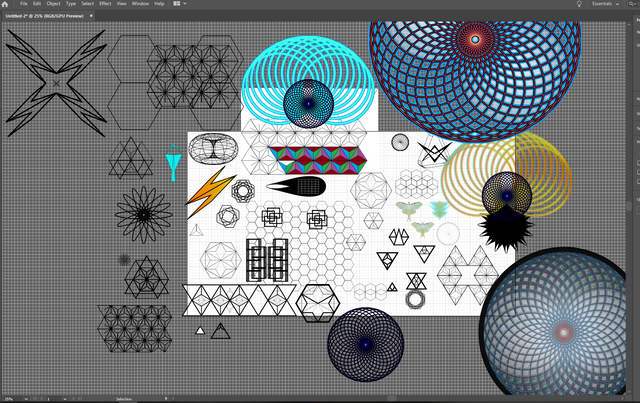Adobe Illustrator Is Fun - This Is How Kids Should Be Learning Geometry, Math, Programming
This one is a collage of some recent photos I took and some practice with vectors and editing in adobe illustrator.

The exterior is just some vector geometric art I made from scratch in illustrator, the interior border consists of effects-laden photos I took of one of my polyphemus moths, the sides are the antennae, the top and bottom are rather indistinguishable but they were created from crop samples of the same image as the antennae. I suppose on closer inspection the fuzzy moth head and the antlers of its antannae might be visible in those borders as well.

These were random first experiments, vectors made from scratch mostly using simple math and geometry with some coloring, layering and effects here and there. Making this kind of digital art is very simple, but very satisfying. These are just rough experiments, all thrown onto the same file. I'm excited to eventually show what I'll be using this stuff for, but first I have to master illustrator, which I'm doing through these experiments.
It occurred to me that just giving kids in school programs like this would show them how to apply all the basic math they're expected to memorize and give them an application and an exciting creative outlet. I wish I'd had this program as a kid, if I actually had a fun applicable reason understand geometry as a kid I would have been incentivized to learn and understand it so I could make better designs. That approach beats the hell out of forcing bored kids into dull rote memorization of the numbers that correspond to the angles of a triangle or the degrees of a circle. The ability for kids to apply, understand, and value the information they're expected to memorize to pass Friday's quiz each week often means nothing to them. They memorize words and numbers as required for a few days without ever really understanding how that information could be useful, and then purposefully forget that information to memorize the next set of meaningless figures for the next week's quiz. If young students simply had these inexpensive programs for design, for programming, for creation of the type of games they obsess over, they would naturally teach themselves all of these skills. They would be excited to learn and understand the use information, because the quality of their creations, whether that's games or art, would depend on their understanding of how to create and code. I can only speak on my own school experience and what I observed from the kids around me-- but the idea that the information we had to temporarily memorize was at all useful or could be applied in anything meaningful or fun was often completely absent in school. The act of taking an interest in anything was never an option, to the extreme point that every student had completely abandoned any possibility of learning in school being interesting, important, or valuable, fixating only on grades and ways to cheat the system, copy others' work and get passing scores. No one ever aspired to learn or teach themselves anything, just to get through the hours of tedious assignments and not get beat by their parents over their grades. Kids who actually took an interest in anything or had any enthusiasm were shamed and bullied, partly because the assignments never appeared to have any value. There are other ways. Kids could be excited to learn and teach themselves things to accomplish their goals. They could be given opportunities instead of coerced into sitting bored out of their minds at a desk for 8 hours a day with endless supply of useless busywork assignments both in and out of the classroom.
If you want to teach someone something, if you really want them to learn, understand, and develop skills, you give them opportunities, not duties. You inspire them. You show them the value, you show them what they could do with their mastery once they attain it, and they will be driven to master their chosen skills on their own.
Learning to use vectors in illustrator is a better way to teach an apply geometry than the typical public school classes from my day, and yes, comparable software was around back then, kids just weren't made aware of it or given any opportunities to use it. I could have been programming the sort of games I enjoyed so much if I wasn't locked in a classroom all day-- teaching myself skills on an application-based, interest-based approach. Then instead of a miserable existence of nothing but conforming to expectations or suffering punishments, I could have been thriving and creating passionately. It isn't too late for future generations. The way we learn and educate must evolve. It is a terrible tragedy that every child's innate curiousity about the world around them is removed by conditioning, and replaced with nothing but fear over what might happen if they don't continue to fall in line and conform.
End rant.
I was homeschooled by my mother until I was 10. In addition to the education she offered me, my curiousity was allowed to thrive, for a few years. I taught myself so much, but all of that was put on hold and driven out of me when I was moved into the normal public school experience. Not only did I have no time left to pursue my interests and teach myself, my enthusiasm and creativity was constantly punished until I was so shamed and conditioned that I hardly had any passionate interests left-- and any enthusiasm I had left I knew that I'd be better off keeping to myself. What if I hadn't had to abandon my path of taking an interest in the world around me until I was 19? 9 years lost-- but not only that, since I had never had the opportunity to master skills, when I was finally out of school, like most people, I had to work. I had to sell my time for money to pay bills-- another time consuming, soul crushing obligation that leaves little time and freedom to pursue any interests. There is a far better way. I resent what happened to me and I wish I could change my youth, but I am truly one of the lucky ones. Most kids don't have until they're 10 to pursue interests passionately. Most people don't reach my age today in my early 30s and finally have enough resolve built up to start pursuing interests passionately again. But that can change. The best we can do for our kids is give them opportunities, inspire them. Give kids access to musical instruments, computer programs that allow them to create things and develop skills. Give them those opportunities, and proceed cautiously with any coercion. I envy many friends of mine who were forced into music lessons as children, because I wish I had the opportunity to learn and play music as a child. But for these friends I speak of, the experience of being forced into playing music every day as a kid has driven the passion and curiosity out of them, the act of practicing and playing music for them feels like a chore, and is associated with childhood trauma and threats of punishment. They all stopped playing as soon as they were able, which seems like a real shame to me. I am certainly thankful that I have any interests left at all, as rare as that seems to be. I regret that I didn't have more opportunities to learn valuable skills in my youth, but I suppose I should be thankful that I wasn't forced into many things that I used to enjoy to the point that those activities became no longer remotely enjoyable.
It is a very grave mistake to think that the enjoyment of seeing and searching can be promoted by means of coercion and a sense of duty. To the contrary, I believe it would be possible to rob even a healthy beast of prey of its voraciousness, if it were possible, with the aid of a whip, to force the beast to devour continuously, even when not hungry.
-Albert Einstein
One had to cram all this stuff into one's mind for the examinations, whether one liked it or not. This coercion had such a deterring effect on me that, after I had passed the final examination, I found the consideration of any scientific problems distasteful to me for an entire year.
-Albert Einstein